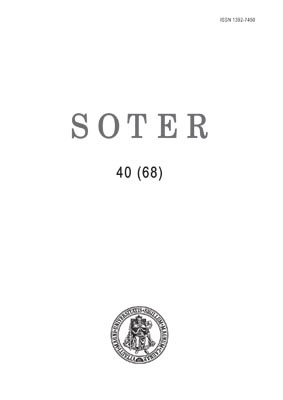Laisvė nelaisvės metu Leonardo Gutausko romanuose „Laiškai iš viešvilės“ ir „Plunksnos“
Freedom tn the Time of Oppression in L. Gutauskas’ Novels “Letters from Viešvilė” and “The Feathers”
Author(s): Gintarė BernotienėSubject(s): Christian Theology and Religion
Published by: Vytauto Didžiojo Universitetas
Keywords: egzistencialijos; sakralizacija; vizijos; mirties įveika; teologemos; aksiologija; Leonardas Gutauskas; existentialias of freedom and death; sacralisation of homeland; visions; defeat of death; theologems of hope and salvation; axiology of literature
Summary/Abstract: Leonardo Gutausko romanuose „Laiškai iš Viešvilės“ ir „Plunksnos“ asmens kūrybinė, pasaulėžiūros ir tikėjimo laisvė iškyla kaip viena esminių būties sąlygų – egzistencialijų. Sovietinio režimo laiku oficialioji kultūra asmenybės vientisumą lemiančią savivoką ignoravo versdama atsisakyti vertybinių nuostatų, prisitaikyti ir paklusti. Straipsnyje romanų herojų vidinės persikėlimo kelionės laike ir mirties kaip transfigūracijos į žemesniuosius (augalų, kraštovaizdžio) Tėvynės pavidalus pasirinkimas siejami su šia dvilype egzistencija. Daroma prielaida, kad fizinio ir metafizinio planų sukeitimas, ryški Tėvynės sakralizacijos linkmė Gutausko romanuose ir ypač poezijoje yra nulemti žmogiškosios erdvės entropijos totalitarinėje sistemoje ir ilgalaikių sovietinių represijų padarinių. Analizuojami Gutausko poezijoje ir romanuose sutampantys krikščioniškąją savivoką liudijantys vaizdiniai, vilties ir išganymo teologemos aksiologinę romanų problematiką įtraukia ir į teologinių svarstymų akiratį. In Leonardas Gutauskas’ novels “Laiškai iš Viešvilės” (“Letters form Viešvilė”) and “Plunksnos” (“The feathers”) personal freedom for creativity, mindset and belief arise as one of the most important conditions for an existence – existentialias. Personal world outlook and faith as a manifestation of individual liberty during the period of Soviet regime was ignored by the official culture, and the integrity of human self-identification was neglected in order to compel one to renounce his axiological attitude, to obey and to adapt. In the article the inner novel characters’ transmigrations in time and the choice of their death as transfigurations to lower forms of the homeland (plants, landscapes) are linked with this double-faced existence. A presupposition is made that the reshuffle of physical and metaphysical plans and the sacralisation of the homeland in Gutauskas’ novels by and especially in his poetry are determined by the entropy of human space in the totalitarian system and the long lasting consequences of soviet repressions. Christian world-outlook representing images, analysed in Gutauskas’ creative works, coinciding theologems of hope and redemption incorporates the axiological problematic of the novels to the horizon of theological considerations.
Journal: SOTER: religijos mokslo žurnalas
- Issue Year: 68/2011
- Issue No: 40
- Page Range: 65-80
- Page Count: 16
- Language: Lithuanian

